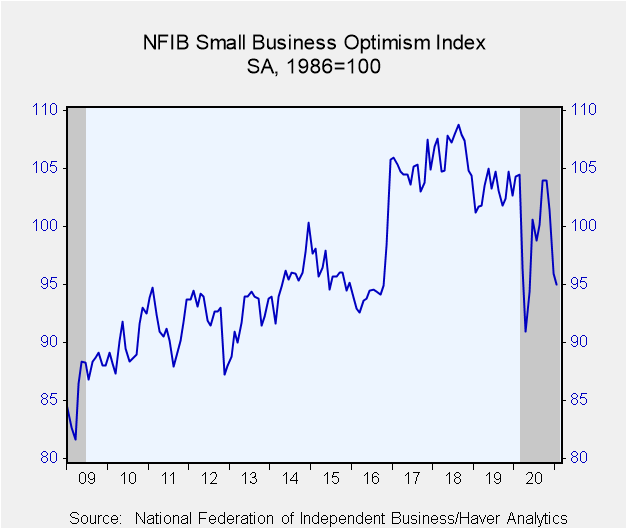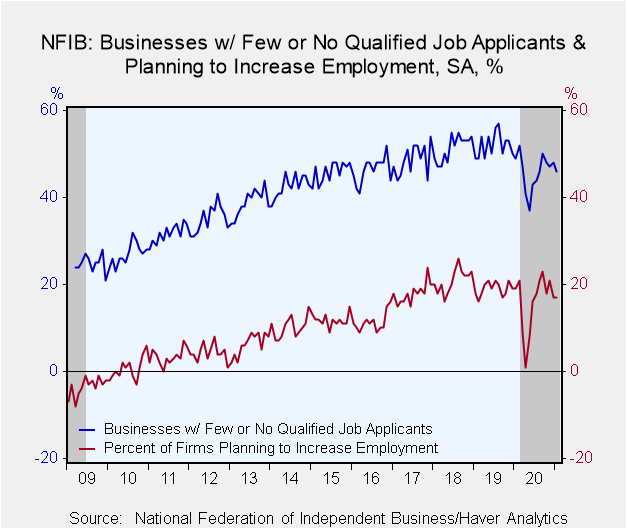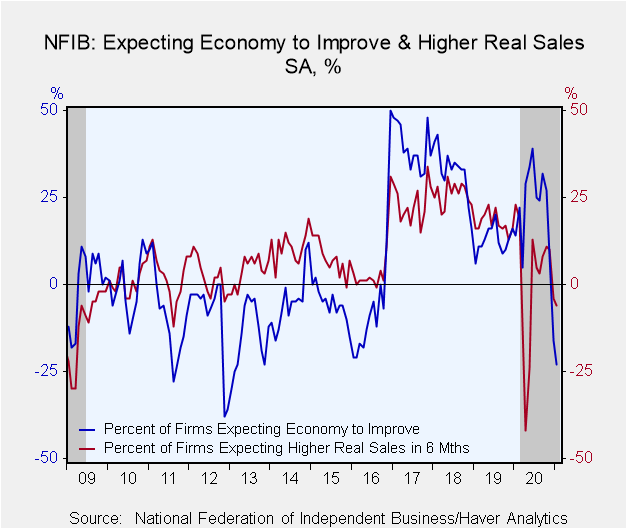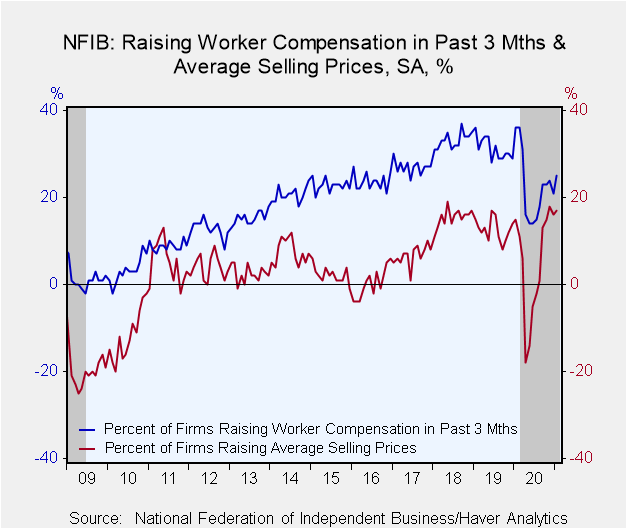 Global| Feb 09 2021
Global| Feb 09 2021U.S. Small Business Optimism Index Eases During January
by:Tom Moeller
|in:Economy in Brief
Summary
• NFIB Small Business Optimism slips to lowest level since May. • Worries about economic growth & sales persist. • Pricing power improves marginally. The National Federation of Independent Business (NFIB) reported that its Small [...]
• NFIB Small Business Optimism slips to lowest level since May.
• Worries about economic growth & sales persist.
• Pricing power improves marginally.
The National Federation of Independent Business (NFIB) reported that its Small Business Optimism Index eased to 95.0 during January, adding to its decline to 95.9 during December. The figure remained well below its October reading of 104.0 and its record of 108.8 in August 2018.
A greatly lessened net -23% of respondents felt that the economy would improve, down from 39% in June. A reduced net -6% expected higher real sales. Earnings trends also deteriorated. A net 8% of firms thought that now was a good time to expand, steady m/m but down from 28% twelve months ago. A net 17% of firms planned to increase employment, down from 23% in September.
Forty-six percent of firms found few or no qualified candidates to fill job openings last month, down from a 57% high in August 2019.
Credit was hard to get by a negligible one percent of respondents, down from April's high of four percent.
Pricing power improved. A higher net 17% of firms raised prices in January, up from 15% twelve months earlier and up from the price deflation reported early last year. A greatly increased net 28% were planning last month to raise prices, the most since November 2018. A higher net 25% of firms raised worker compensation while a moderately increased 17% planned to do so over the next three months.
The most important issues for small businesses were lessened quality of labor (21%), taxes (19%) which is up from 17% twelve months earlier, and government requirements (15%), up from 10% in April of last year. The cost of labor troubled a slightly higher seven percent of respondents while competition from large businesses concerned a steady eight percent. Inflation worried an increased three percent of respondents.
Roughly 24 million small businesses exist in the U.S. and they create 80% of all new jobs. The typical NFIB member employs 10 people and reports gross sales of about $500,000 a year. The NFIB figures can be found in Haver's SURVEYS database.
| National Federation of Independent Business (SA, Net % of Firms) | Jan | Dec | Nov | Jan '20 | 2020 | 2019 | 2018 |
|---|---|---|---|---|---|---|---|
| Small Business Optimism Index (1986=100) | 95.0 | 95.9 | 101.4 | 104.3 | 99.6 | 103.0 | 106.7 |
| Firms Expecting Economy to Improve | -23 | -16 | 8 | 14 | 20 | 13 | 32 |
| Firms Expecting Higher Real Sales | -6 | -4 | 10 | 23 | 1 | 18 | 26 |
| Firms Reporting Now Is a Good Time to Expand the Business | 8 | 8 | 12 | 28 | 13 | 25 | 30 |
| Firms Planning to Increase Employment | 17 | 17 | 21 | 19 | 16 | 19 | 21 |
| Firms With Few or No Qualified Applicants for Job Openings (%) | 46 | 48 | 47 | 49 | 46 | 52 | 51 |
| Earnings Trends | -16 | -14 | -7 | -3 | -16 | -5 | -2 |
| Firms Reporting that Credit Was Harder to Get | 1 | 3 | 2 | 4 | 3 | 4 | 4 |
| Firms Raising Average Selling Prices | 17 | 16 | 18 | 15 | 5 | 13 | 15 |
| Firms Raising Worker Compensation | 25 | 21 | 24 | 36 | 23 | 31 | 33 |
Tom Moeller
AuthorMore in Author Profile »Prior to joining Haver Analytics in 2000, Mr. Moeller worked as the Economist at Chancellor Capital Management from 1985 to 1999. There, he developed comprehensive economic forecasts and interpreted economic data for equity and fixed income portfolio managers. Also at Chancellor, Mr. Moeller worked as an equity analyst and was responsible for researching and rating companies in the economically sensitive automobile and housing industries for investment in Chancellor’s equity portfolio. Prior to joining Chancellor, Mr. Moeller was an Economist at Citibank from 1979 to 1984. He also analyzed pricing behavior in the metals industry for the Council on Wage and Price Stability in Washington, D.C. In 1999, Mr. Moeller received the award for most accurate forecast from the Forecasters' Club of New York. From 1990 to 1992 he was President of the New York Association for Business Economists. Mr. Moeller earned an M.B.A. in Finance from Fordham University, where he graduated in 1987. He holds a Bachelor of Arts in Economics from George Washington University.
More Economy in Brief
 Global| Feb 05 2026
Global| Feb 05 2026Charts of the Week: Balanced Policy, Resilient Data and AI Narratives
by:Andrew Cates










